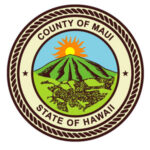 As announced by Hawaiian Electric Co. and reported in The Maui News (May 19, 2011), Maui has been selected as the site for a “smart grid” renewable energy demonstration project, with an investment of approximately $37 million from the Japan-based New Energy and Industrial Technology Development Organization (NEDO).
As announced by Hawaiian Electric Co. and reported in The Maui News (May 19, 2011), Maui has been selected as the site for a “smart grid” renewable energy demonstration project, with an investment of approximately $37 million from the Japan-based New Energy and Industrial Technology Development Organization (NEDO).
Japanese and American energy partners will collaborate on the multimillion dollar project, which is aimed at improving integration of variable renewable energy resources, such as solar and wind power, and preparing the electric system for widespread use of electric vehicles.
The organizations partnering on the project include: the U.S. Department of Energy; the Hawaii Department of Business, Economic Development and Tourism (DBEDT); the Hawaii Natural Energy Institute at the University of Hawaii; Hawaiian Electric Company; Maui Electric Company; and NEDO, an entity under the government of Japan’s Ministry of Economy, Trade and Industry.
The six Japanese companies that will work with U.S. project partners to develop and install smart-grid technologies on Maui include Hitachi Ltd., Hewlett-Packard Japan Ltd., Mizuho Corporate Bank Ltd., Sharp Corp., JFE Engineering Corp. and Cyber Defense Institute Inc.
Installation of the smart-grid technology is expected to begin in late 2012, with the project becoming operational in 2013. The project is scheduled to run from 2013 to 2015.
“With its high levels of variable renewable energy, Maui is a perfect location to test these smart-grid technologies,” said Richard Rocheleau, director of the Hawaii Natural Energy Institute at the University of Hawaii. “Through this Japanese-U.S. partnership, we can demonstrate how these technologies can help solve Maui’s energy challenges and be used in other parts of the world, especially on other island systems such as ours.”
“Like Hawaii, Japan is looking for ways to better use clean energy on smaller electric systems that serve individual islands. By pooling our resources and our expertise, we can develop solutions that will help significantly increase our use of clean energy sources,” said Robbie Alm, Hawaiian Electric executive vice president.
Hawaiian Electric officials said that the project will include installation of smart controls in Kihei, South Maui, at the regional and neighborhood levels to improve integration of variable renewable energy resources, such as photovoltaic systems and controls to manage electric vehicle charging stations and battery storage systems. This NEDO project will also collaborate with an existing U.S. Department of Energy-funded project by installing the same smart control systems within the project site in the Wailea area of Maui.
The project is aimed at being a solution to one of the biggest challenges in integrating an existing power grid with renewable energy, which fluctuates depending on whether it’s windy or the sun is shining. Electric grids need a consistent, reliable source of power, which so far has been provided primarily through turbines driven by diesel or other fossil fuels.
“A smarter electric grid is a promising solution to one of the biggest challenges in deploying more renewable energy in Hawaii,” said Estrella Seese, acting energy program administrator for the state Department of Business, Economic Development and Tourism’s Energy Office. “Technical innovations such as smart-grid applications will increase the island grid’s capability to minimize the system reliability impact of interconnected renewable energy resources and can make Hawaii a model for other areas around the world that face similar conditions,” she said.
In addition, to help prepare the Maui electric grid for widespread adoption of electric vehicles, the project will use an advanced charging management system to connect Maui Electric Company system controls with charging stations island-wide, allowing Maui Electric to actively manage electric vehicle charging to balance generation and load. With this advanced system, Maui Electric can make better use of the wind and solar power on the island.
The project is part of the Hawaii-Okinawa Partnership on Clean and Efficient Energy Development and Deployment, which was signed by the U.S. Department of Energy; the Ministry of Economy, Trade and Industry of Japan; the state of Hawaii; and the prefecture of Okinawa in June 2010.
